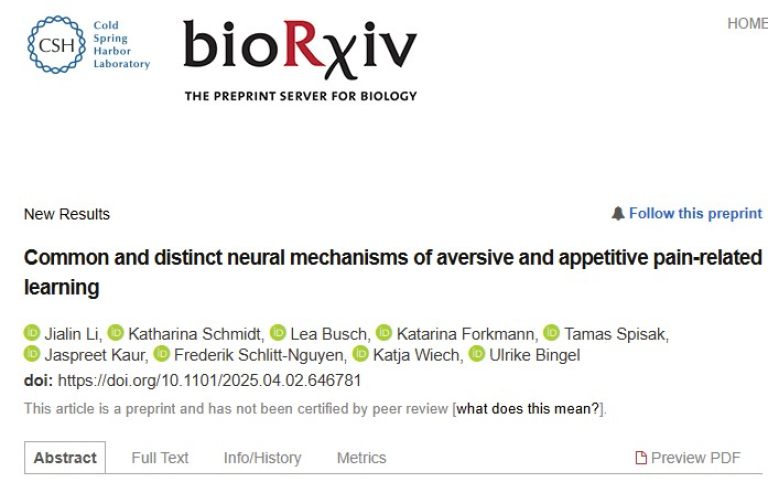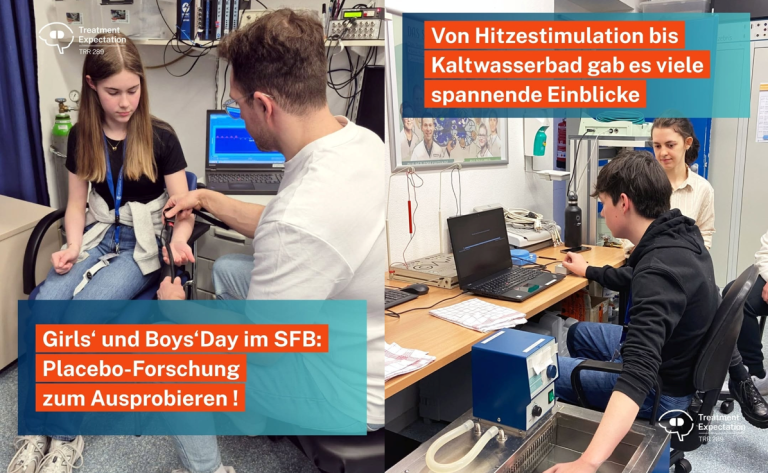Lab members surrounding Jialin Li published a new preprint on BioRxiv as part of the SFB 1280. Appetitive and aversive conditioning are both fundamental to adaptive behaviour, yet there remains limited understanding of how they differ on the behavioural and neural level. We investigated the two processes during acquisition and extinction using functional magnetic resonance imaging and behavioural measures. The results suggest that while appetitive and aversive learning share activation in regions involved in sensory processing (occipital lobe) and learning (vmPFC), aversive learning uniquely engages areas promoting rapid acquisition (mediodorsal thalamus and locus coeruleus) and cautious unlearning, in line with the notion of a ‘better-safe-than-sorry’ strategy. Read more about the work here.
We participated in the Forschungstag 2022!
The Bingel Laboratory
Translational Pain Research Unit
University Medicine Essen
Prof. Dr. Ulrike Bingel
News

New preprint on BioRxiv

New publication in eLife
In a new preregistered study, we set out to compare the magnitude and duration of placebo versus nocebo effects in healthy volunteers, and also to examine the different factors contributing to these effects. Despite the clinical relevance of these effects, the question of how placebo and nocebo effects differ in strength and duration remains largely unexplored.
In this preregistered study, we used a within-subject design in 104 healthy to investigate and directly compare the magnitude and persistence of placebo and nocebo effects on experimental pain. Effects were assessed immediately after their induction through verbal instructions and conditioning and at a one-week follow-up.
Significant placebo and nocebo effects were detected on day 1 and day 8, but nocebo effects were stronger on both test days. Sustained effects after one week were primarily predicted by individuals’ experienced effects on day 1. Our findings underscore the enduring nature of placebo and nocebo effects in pain, with nocebo responses demonstrating consistently greater strength, which is consistent with an evolutionarily advantageous ‘better-safe-than-sorry’ strategy. These insights emphasise the significant impact of nocebo effects and stress the need to prioritise efforts to mitigate them in clinical practice.

Boys and Girls Day
Last week, we invited six kids and adolescents to the Bingellab for a day of research and pain experiments! First, PhD and medical doctoral students presented what they are working on as researchers and what a typical day in their life looks like. Then, some activities followed, for example, “Guess which fruit was measured in the MRI scanner?” They could also try out different types of pain induction like electrical, heat or cold water pain, and got some information what transcranial magnetic stimulation is for. Lastly, the rubberhand illusion and making brain helmets is always fun! We definitely enjoyed the day and hope the girls and boys did too!
Two ELAN grants for the Bingellab!
Two medical doctoral students of the Bingellab, Aoibhne Braunewell and Hannah Gronewold, secured two of the competitive ELAN grants. From the summer semester 2025 onwards, they will conduct their doctoral projects as part of the lab.
Aoibhne’s ELAN light project will compare the empathic and prosocial abilities of people with and without chronic pain conditions such as chronic back pain to investigate how people with persistent pain can understand and share the pain of others around them.
Hannah’s ELAN project aims to investigate the impact of experienced side effects on subsequent treatment decisions using an experimental pain paradigm. By understanding these effects, they seek to improve patient adherence and optimize decision-making in pharmacotherapy in the long run.

New publication in AMPPS
Performing high-quality research can be challenging, especially for early career researchers! Helena Hartmann and her colleagues created a solution: ARIADNE – a living and interactive resource navigator that helps to use and search a dynamically updated database of resources. In the corresponding published tutorial in the journal Advances in Methods and Practices in Psychological Science, they guide researchers through a standard research project using ARIADNE along the way. Read the paper here and try out the tool here!

Learn about the power of expectations
We warmly invite you to this great online patient forum (in German) on 29.9.2024 from 17:30 – 19:15 where Ulrike Bingel, Helena Hartmann, and Sven Benson will talk about the power of expectations. Click here to download the flyer and here to register for the Zoom webinar.

Great expectations at the WTZ-Aktionstag!
At the WTZ-Aktionstag organized by the Westdeutsches Tumorzentrum, some of the Bingellab’s members showed patients and colleagues what and how we are researching treatment expectations and their effects on pain. Thanks to all people who were interested in our work!

New publication in Frontiers in Psychology
A CRC/TRR 289 research team from the Universities of Marburg, Giessen and Essen (including the Bingellab) investigated how treatment expectations influence treatment success and how homeopathy uses these effects. Homeopathy is often presented as having no effect at all because no effect beyond the placebo effect has been proven. Globules do not contain any pharmacologically active ingredients that could rationally explain an effect, yet both patients and homeopaths report positive effects for various disorders. How can this be explained? Read the original publication here.

New publication in the journal Pain
Interdisciplinary multimodal pain treatment (IMPT) represents an effective treatment option for chronic pain. Alas, it is also a very expensive and personnel-intensive intervention. Although IMPT could be accomplished in a resource-saving day hospital setting, there is no general insurance coverage for it and thus, IMPT is usually conducted in an in-patient setting. In this study, members of the CRC compared the differences in treatment outcome between, an otherwise identical, ambulatory and in-patient IMPT, at the back pain center Essen, in a matched cohort. Our data provide novel insights by suggesting at least equal effectiveness of ambulatory compared with in-patient IMPT for patients with chronic back pain. Moreover, ambulatory treatment seemed partly superior, with greater improvements in pain-related disability 3 months and in pain intensity 6 months post treatment. This advantage could have been driven by a larger gain in pain-related self-efficacy, which was already present, directly post-treatment for ambulatory patients. Read the english publication led by Dustin Maser and Ulrike Bingel in the journal Pain here.

New comment in the journal Brain
The therapeutic effect of medicines is determined by more than their pharmacological properties. Factors such as the colour of a tablet, its taste and even its price have been found to significantly influence efficacy. This insight has sparked optimism about the potential to enhance drug effects by tweaking these and other features to optimize therapeutic outcomes. In a new article published in Brain, Schenk and colleagues add a somewhat counter-intuitive factor to the list of features that could be targeted to boost the efficacy of a drug: side effects. Read the english commentary by Katja Wiech, Helena Hartmann, and Ulrike Bingel in the journal Brain here. You can find the original study here.

The Bingel Laboratory
Prof. Dr. med. Ulrike Bingel
Clinical Neurosciences
University Hospital Essen
Department of Neurology
Hufelandstraße 55
45147 Essen
Germany
Fon: +49 (0) 201 723 - 2446
Fax: +49 (0) 201 723 - 6882
Mail:
Copyright 2021 - Bingel Laboratory




